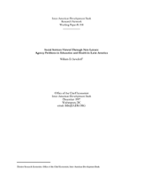Social Services Viewed Through New Lenses: Agency Problems in Education and Health in Latin America
Date
Dec 1997
Latin America spends large amounts of resources on social services, yet its life expectancy and education levels are low compared to other regions with similar levels of income. A key reason is the inherent difficulty of making social services produce efficiently in response to demands and needs. This working paper shows how improving the organization of these service systems can make a significant difference in health conditions and student learning. A general framework applying the lessons of theories of the firm to the particularities of social services is developed, followed by a summary of case studies which assess the impact of organization on performance in education and in health. The paper shows that the relationships and rules followed by governments, service providers, and consumers can mean the difference between success and failure. It also describes a wealth of approaches that point toward better ways of organizing social services and ultimately improving health and education in the region.



